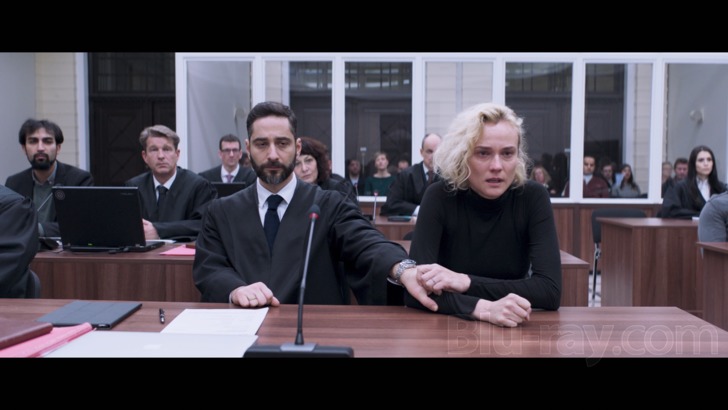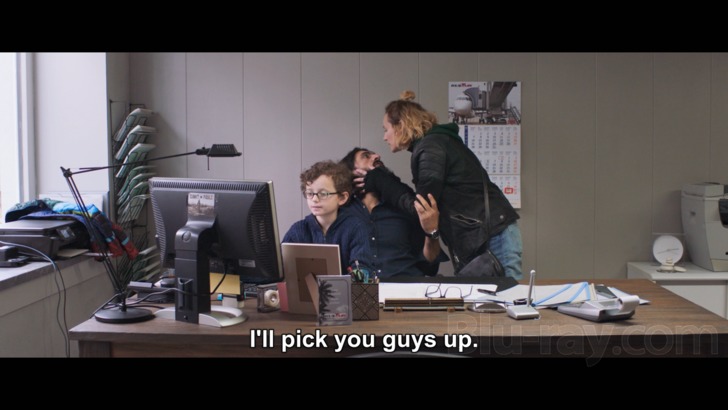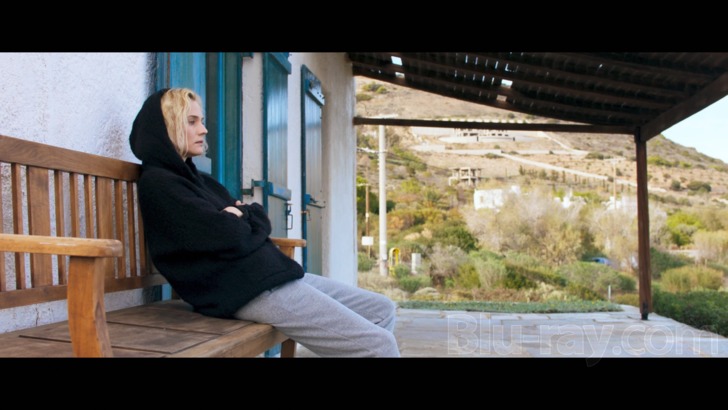In the Fade Blu-ray Movie
HomeIn the Fade Blu-ray Movie 
Aus dem NichtsMagnolia Pictures | 2017 | 106 min | Rated R | May 01, 2018
Movie rating
7.2 | / 10 |
Blu-ray rating
| Users | 0.0 | |
| Reviewer | 4.0 | |
| Overall | 4.0 |
Overview
In the Fade (2017)
Katja's life collapses after the death of husband and son in a bomb attack. After the time of mourning and injustice, here comes the time of revenge.
Starring: Diane Kruger, Denis Moschitto, Johannes Krisch, Samia Muriel Chancrin, Numan AcarDirector: Fatih Akin
| Foreign | Uncertain |
| Crime | Uncertain |
| Drama | Uncertain |
Specifications
Video
Video codec: MPEG-4 AVC
Video resolution: 1080p
Aspect ratio: 2.39:1
Original aspect ratio: 2.39:1
Audio
German: DTS-HD Master Audio 5.1 (48kHz, 24-bit)
English: DTS-HD Master Audio 5.1 (48kHz, 24-bit)
Subtitles
English, English SDH, Spanish
Discs
Blu-ray Disc
Single disc (1 BD)
BD-Live
Packaging
Slipcover in original pressing
Playback
Region A (locked)
Review
Rating summary
| Movie | 4.5 | |
| Video | 4.5 | |
| Audio | 4.0 | |
| Extras | 2.0 | |
| Overall | 4.0 |
In the Fade Blu-ray Movie Review
The Wages of Grief
Reviewed by Michael Reuben May 6, 2018Death comes randomly in the films of German writer/director Fatih Akin. It can suddenly
and unexpectedly remove a major character from the scene, as it does in The Edge of Heaven. It
can abruptly alter a protagonist's fate, sending him in a totally new direction, as it does in Head-On. It can serve as a deus ex machina, magically producing a happy ending—to the extent one
can say that any of Akin's films ends happily—as it does in Soul
Kitchen.
But in Akin's latest film, death sets the plot in motion and governs every subsequent event, and
whether or not these deaths are truly "random" is a critical question uncomfortably looming
over the film. Titled In the Fade for its American release—the original title, "Aus dem
Nichts", translates literally as "From Nothing"—Akin's searing portrait of a woman whose life
and family are destroyed by a terrorist bombing was Germany's submission to the 2018 Oscars
and won the Golden Globe for Best Motion Picture: Foreign Language. Star Diane Kruger,
playing her first film role in her native tongue after a successful career abroad, won the Best
Actress Award at the 2017 Cannes Film Festival for her revelatory performance. If you only
know Kruger as Helen of Troy in Wolfgang Petersen's misbegotten
epic or as Nicolas Cage's
love interest in the National Treasure films
or as the actress/spy in Inglourious Basterds,
prepare
to experience something new and amazing.

It is impossible to discuss In the Fade without revealing plot developments that might be considered spoilers, although I would argue that these specific events are not the film's real subject or the reason it is worth watching. Nevertheless, those who wish to experience Akin's and Kruger's work "cold" should skip to the technical sections.
As usual in Akin's films, In the Fade is divided into chapters identified by intertitles. Here there are three chapters, which neatly separate the film into acts: "The Family", "Justice" and "The Sea". The film's protagonist is Katja (Kruger), a native German born and raised in the northern province of Schleswig-Holstein. After an undistinguished university career, she dropped out and married a Kurdish immigrant, Nuri Sekerci (Numan Acar), whom she first met when he sold her hashish as a student. The wedding ceremony was held in the prison where Nuri was serving four years for drug dealing, but he spent his jail time studying business administration and now runs a successful storefront firm in Hamburg's Turkish district, offering translation services and tax preparation to fellow immigrants. Katja assists with the bookkeeping, but her principal job is mother to their five-year-old son, Rocco (Rafael Santana), a cheerful kid whose presence lights up the eyes of both parents. After an aimless and rebellious youth, Katja has emerged in adulthood as a solidly respectable, if somewhat unconventional, middle-class mom.
On one fateful afternoon, Katja drops off Rocco at his father's office while she joins her pregnant sister (Samia Chancrin) for a spa day. When she returns, the busy street is a sea of flashing lights, and the area has been cordoned off by police and first responders, after someone detonated a homemade fragmentation bomb. Nuri and Rocco have both been killed, their bodies so badly damaged that only parts remain. In a blinding instant, Katja's life as she knew it is over, her daily routines replaced by funeral preparations, police inquiries and tense family interactions (parents on both sides clearly disapproved of the marriage, and her in-laws irrationally blame her for their grandson's death). In private moments, Katja watches iPhone videos of her husband and son and curls up in Rocco's bunk beds, desperately seeking solace for the paralyzing waves of grief that have become her new reality. Akin's camera remains focused on Katja and her suffering, even as the film tracks the official investigation, which, to Katja's dismay, initially focuses on Nuri's criminal past.
The bombing is ultimately attributed to a Neo-Nazi couple, André and Edda Möller (Ulrich Brandhoff and Hanna Hilsdorf), who are arrested, charged and tried in a judicial proceeding played out in excruciating detail, as Katja struggles (and sometimes fails) to maintain her composure. She insists on hearing every moment of testimony, even the horrific detail of the medical examiner's report, which her lawyer and family friend, Danilo (Denis Moschitto), urges her to skip. No one doubts the defendants' guilt, especially after André's own father (Ulrich Tukur) appears as a prosecution witness against him. But the trial takes an unexpected turn with the appearance of surprise defense witness, a Greek hotelier (Yannis Economides) with ties to his country’s National Socialist party. Katja is denied the closure teased by the chapter’s title, “Justice”; indeed, she is devastated anew.
The film's third act, "The Sea", is its most provocative and unsettling. In a Hollywood version of In the Fade, Katja might be shown acquiring weapons, shooting targets at a gun range and training in martial arts, as she prepares to embark on a Death Wish-style vengeance spree. But Akin isn't interested in such formulaic resolutions. Katja sets off on a personal quest, but she does so without preparation or plan, driven by a compulsion that she doesn’t even try to understand. As she repeatedly ignores Danilo’s frantic phone calls, it’s as if she instinctively grasps that there is nothing left for her in her former home. Her most important relationship is now with the forces that deprived her of her family. The unanswered question is what to do if she actually succeeds in confronting them.
Kruger's embodiment of Katja is quietly devastating, and her expression of the woman's rage and pain is all the more impressive for being created largely through wordless behavior. Before the explosion, Katja converses volubly with friends and family. Afterward, it is those around her who do most of the talking. In moments both public and private, Kruger conveys the sheer effort required for Katja to face each new day without her loved ones. Akin is a first-generation German citizen born to Turkish parents, and he concludes In the Fade with a text screen reciting statistics about hate crimes committed against immigrants, but his true interest is the aftermath of such crimes and the agony of those left behind. Katja's response to such suffering may be extreme, but it has an undeniable logic, and Akin goes out of his way to suggest that her decision, however radical, may have actually brought her back to life.
In the Fade Blu-ray Movie, Video Quality 

In the Fade was shot by director Fatih Akin's long-time creative partner, Rainer Klausmann, of
whom Akin has said that their collaboration is so intimate that "[o]ur communication on-set
has been reduced to the odd grunt because we hardly have anything to discuss". (Aside from
working with Akin, Klausmann's work includes the cinematography of Downfall and The
Baader Meinhof Complex.) If IMDb is to be believed, the film was shot digitally on the Arri
Alexa, although the image on Magnolia Home Entertainment's 1080p, AVC-encoded Blu-ray
often has a distinctive texture reminiscent of film. While many scenes are sharply detailed, Akin
and Klausmann frequently soften the image with smoke or rain, and they do not hesitate to stage
scenes in darkened spaces or to cast deep shadows across parts of the frame. The judicial
proceedings in the lengthy second act are the most consistently bright and illuminated, almost to
an extreme, and these are also the scenes that are most overtly digital. But the entire film has
excellent detail and clarity, even when darkness obscures much of the frame (and even in the
iPhone videos that Katja watches to seek comfort in happy memories).
In the Fade has a naturalistic palette with muted colors broken by flashes of bright hues like the
jacket that Rocco is wearing when Katja brings him to his father's office. Several environments
reflect a more stylized palette, e.g., the spa that Katja visits with her sister in the first act
(screenshot 8) and the crowded bar to which Katja and her lawyer retire after a hard day in court
(screenshot 4). The final chapter features vivid blues and greens, as Katja journeys abroad to
seaside locations.
The image is free of aliasing, interference, artifacts or other blemishes. Magnolia has mastered In
the Fade with an average bitrate of 24.98 Mbps, which is respectable, but since they have used
barely 30 gigabytes of the available space on a BD-50, one has to wonder why they failed to take advantage
of the opportunity for more generous compression.
In the Fade Blu-ray Movie, Audio Quality 

In the Fade's 5.1 soundtrack is presented in a choice of either original German or an English dub
track. Both have been encoded in lossless DTS-HD MA. The mix provides a good sense of
ambiance in environments ranging from the bustling street outside Nuri's storefront
establishment, to the echoes and dripping water of the spa that Katja visits with her sister
(unaware of the tragedy unfolding elsewhere), to the hushed courtroom with its formal
presentations and rustling papers. There is one major sonic effect in the film's third act that
cannot be described without spoilers, but suffice it to say that the track handles the demands
appropriately. My German is just good enough to allow me to confirm that the original dialogue
is clearly rendered; I did not listen to the English track.
Perhaps the most striking and distinctive feature of In the Fade's soundtrack is its brooding score
by Josh Homme, lead singer and guitarist of Queens of the Stone Age. Director Fatih Akin has
offered the following account of how this American rock musician came to write the score:
I listened to a lot of Queens of the Stone Age music when I was writing the screenplay. They have these fatalistic songs. It came to me that fatalism was the right attitude for this film. I made a Queens of the Stone Age playlist for the character of Katja. I asked my music supervisor to clear the rights to those songs and she suggested that I ask the band. I was able to speak with the group's founder and lead vocalist Josh Homme. He saw a very rough cut of the film and he liked it! Maybe it hit the same nerve where his songs come from. He was busy finishing the group's new album, but he still agreed to work on the film. . . . I've always wanted to do a thriller or at least work with some elements of that genre. Integrating this music has definitely given the film that quality.
In the Fade Blu-ray Movie, Special Features and Extras 

While the extras are numerous, most of them are brief and conclude with the film's German
release date, underlining their promotional nature.
- Behind In the Fade: The Story (1080p; 1.78:1; 1:30): A short introduction with Kruger and Akin. In German, with English subtitles.
- Behind In the Fade: Diane Kruger and Writer/Director Fatih Akin (1080p; 1.78:1; 1:39): Akin and Kruger on their collaboration, with brief contributions from other cast members. In German, with English subtitles.
- Behind In the Fade: Cannes (1080p; 1.78:1; 1:39): The festival experience. In German, with English subtitles.
- Inside In the Fade with Writer/Director Fatih Akin: Diane Kruger (1080p; 1.78:1; 0:44): A promotional spot. In German, with English subtitles.
- Inside In the Fade with Writer/Director Fatih Akin: Denis Moschitto (1080p; 1.78:1; 0:52): A second promotional spot. In German, with English subtitles.
- Interview with Diane Kruger (1080p; 1.78:1; 3:52): Interviewed in English, the actress discusses her return to Germany after working abroad for 25 years, her preparation for playing Katja and her working relationship with the director.
- Interview with Writer/Director Fatih Akin (1080p; 1.78:1; 8:10): In the most substantive of the extras, Akin describes (in English) the inspiration of the story, which dates back to his teenage years in the Nineties. He also discusses in more detail his working relationship with his lead actress.
- Theatrical Trailer (1080p; 2.40:1; 2:07): In German, with English subtitles.
- Also from Magnolia Home Entertainment: Trailers for Please Stand By, The Final Year, The Square and Blade of the Immortal.
- BD-Live: "Check back later for updates."
In the Fade Blu-ray Movie, Overall Score and Recommendation 

It is impossible to watch Akin's film without reflecting on the immigration debates currently
roiling the political landscape in both Europe and America. But In the Fade isn't a "message"
film, despite the director's nod to recent events in the closing frames. Akin makes no secret of
his allegiance to the immigrant community, but his choice of a classically blonde, blue-eyed
Aryan as the film's protagonist is deliberate and purposeful, emphasizing the universality of
family devotion and the equally universal agony when violence rips families apart. The political
climate may change in future years, but In the Fade will remain a vital and electrifying account
of one woman's harrowing battle with unimaginable loss. Highly recommended.
Similar titles
Similar titles you might also like

A Touch of Sin
天注定 / Tian zhu ding
2013

A Fantastic Woman
Una mujer fantástica
2017

Capernaum
Capharnaüm
2018

Bullhead
Rundskop
2011

The Club
El Club
2015

The Third Murder
三度目の殺人
2017

Dheepan
2015

Pixote
Pixote: A Lei do Mais Fraco
1980

The Lost Honor of Katharina Blum
Die verlorene Ehre der Katharina Blum
1975

Taxi
2015

The Insult
L'insulte
2017

Killer Cop
La polizia ha le mani legate
1975

Beyond the Hills
După dealuri
2012

The Marriage of Maria Braun
Die Ehe der Maria Braun
1978

The Attack
2012

Omar
2013

A Hidden Life
2019

The Salesman
Forushande
2016

Better Days
少年的你 / Shǎo nián de nǐ
2019

Pioneer
Pionér
2013
